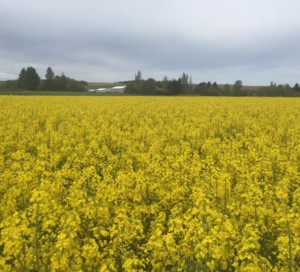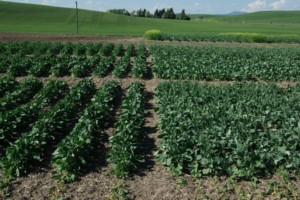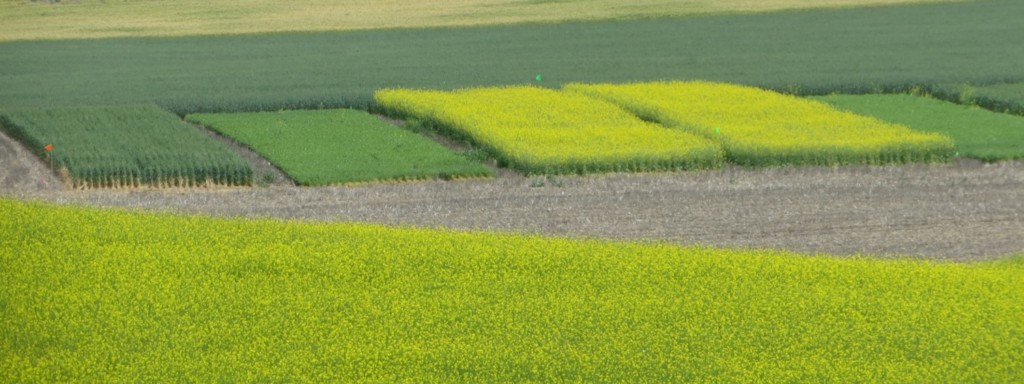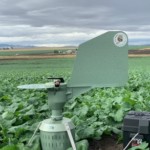 By Kurtis Schroeder, Ph.D.
By Kurtis Schroeder, Ph.D.
Crop options are limited in the wheat-dominated dryland areas of the inland Pacific Northwest (PNW) and few rotation crops return a profit similar to winter wheat. However, canola is adapted to the PNW and both spring and winter canola can be grown profitably in the region. Canola adds several benefits in rotation with cereal crops, including reduced plant disease, additional weed control and management options, and in the case of winter canola, increased water infiltration. As a result, a multistate project in Idaho, Washington, Oregon and Montana is being funded by a grant from the National Institute of Food and Agriculture. The goals are to develop regionally adapted canola cultivars and advance agronomic practices to optimize canola performance, thereby increasing regional canola acreage.

The breeding program at the University of Idaho develops both spring and winter canola, but with greater emphasis on winter cultivars, which offer the largest acreage potential. In addition to traditional breeding, the team is also working with novel genes for resistance to blackleg and improved cold tolerance in winter canola. The most notable result from this project in the past year was the licensing of the winter cultivar ‘Chinook’ to WinField United, which is marketing the variety as CROPLAN® CP1022WC G2FLEX™. This is a non-GMO cultivar that provides tolerance to group 2 herbicides such as Beyond, allowing more flexibility in incorporating canola into rotations (hence, the trait designation G2FLEX™).
 Other contributions from this project have included work on row spacing and seeding rates in spring canola. Seeding rates of 350,000 or 500,000 seeds per acre resulted in similar yields. Surprisingly, row widths up to 21 inches performed better than traditional seeding widths of 7 inches. While these findings are being confirmed, both discoveries may reduce crop competition with weeds and the wider row spacing may allow for better herbicide penetration into the crop canopy. Crop rotation studies continue in the PNW, incorporating spring canola into cereal rotations. Winter wheat crops following winter canola resulted in wheat yield increases 17 percent higher than wheat following wheat. Yield increases in wheat following spring canola were more modest. However, a big advantage of spring canola compared to spring wheat or chickpea was the superior weed suppression by the canola crop.
Other contributions from this project have included work on row spacing and seeding rates in spring canola. Seeding rates of 350,000 or 500,000 seeds per acre resulted in similar yields. Surprisingly, row widths up to 21 inches performed better than traditional seeding widths of 7 inches. While these findings are being confirmed, both discoveries may reduce crop competition with weeds and the wider row spacing may allow for better herbicide penetration into the crop canopy. Crop rotation studies continue in the PNW, incorporating spring canola into cereal rotations. Winter wheat crops following winter canola resulted in wheat yield increases 17 percent higher than wheat following wheat. Yield increases in wheat following spring canola were more modest. However, a big advantage of spring canola compared to spring wheat or chickpea was the superior weed suppression by the canola crop.

Research also is being conducted to better understand the fungal blackleg pathogen, Leptosphaeria maculans, and to make improvements to fungicide application strategies to help manage this disease. Spore traps are being used to determine when L. maculans is active in hopes of improving fungicide timing. When disease pressure was low in winter canola, a single fungicide application in either the fall or spring was sufficient to keep the disease at very low levels. However, when the incidence of disease exceeded 50 percent, a fall and spring application provided superior control to a single fall or spring application. The work is preliminary and more research will be needed to make a definitive recommendation.

Spore trap in canola on Camas Prairie
One of the most important activities of the project is to educate growers about new cultivars and optimal agronomic practices for growing canola in the PNW. Due to the pandemic, 2020 was a challenging year with most live events being cancelled. However, a number of virtual workshops were held during the winter and we are all eager to return to hand-on activities soon. The efforts of this project have helped to expand canola acreage in the PNW to 302,500 in 2020, an average increase of over 45,000 acres per year over the past four years.
Kurtis Schroeder, Ph.D., is cropping systems agronomist and associate professor in the Department of Plant Science at the University of Idaho in Moscow.